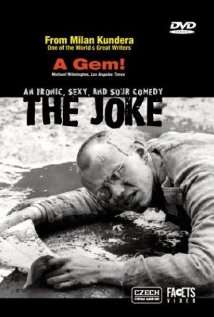The Joke (film)
| The Joke | |
|---|---|
 | |
| Directed by | Jaromil Jireš |
| Produced by | Miloš Stejskal |
| Screenplay by | Jaromil Jireš and Milan Kundera |
| Based on |
The Joke by Milan Kundera |
| Starring | Josef Somr, Jana Dítětová, Luděk Munzar |
| Music by | Zdeněk Pololáník |
| Cinematography | Jan Čuřík |
| Edited by | Josef Valušiak |
Running time | 81 min |
| Country | Czechoslovakia |
| Language | Czech |
The Joke (Czech: Žert) is a 1969 Czechoslovakian film by director Jaromil Jireš. It is considered one of the last films of the Czech New Wave movement.[1]
Based on Milan Kundera's novel of the same name, The Joke tells the story of Ludvík Jahn, a man expelled from the Czechoslovakian Communist Party for an idle joke to his girlfriend, and the revenge he later seeks through adultery. The film was produced during the political liberalization of the 1968 Prague Spring and contains many scenes which satirize and criticize the country's communist leadership. Amos Vogel wrote that the film was "possibly the most shattering indictment of totalitarianism to come out of a Communist country".[2]
Plot
The scientist Ludvík Jahn returns to his hometown after two decades away. He is interviewed by Helena, an attractive older woman whom he begins to seduce. Jahn then discovers Helena is married to Pavel, an old rival.
Jahn flashes back to his college days and his love for Markéta, a devout believer in communism. In an attempt to make the humorless Markéta lighten up, Jahn sends her a postcard reading "Optimism is the opium of mankind. A 'healthy spirit' stinks of stupidity. Long live Trotsky! Yours, Ludvík". Marketa turns the postcard over to the Party, however, and Jahn is brought before a party hearing to answer for his words. Pavel, a friend who had pledged to help him, calls in the meeting for Jahn's expulsion from the college and the Communist Party, and Marketa joins the vote against him.
Jahn then undergoes six years of "reeducation", which are split between prison, mining, and army service under a sadistic drill sergeant. While in the army, a true believer of communism in his unit appeals to higher authorities against their treatment; when the man is consequently expelled from the Party, he commits suicide.
In the present, Jahn successfully seduces Helena, motivated more from a desire for revenge on Pavel than attraction to her. Though Helena falls in love with him, he discovers that she and Pavel have long been estranged, and Pavel has a new lover of his own.
Reception
The Joke was released in 1969, some months after the August 1968 Warsaw Pact invasion of Czechoslovakia had put an end to the freedoms of the Prague Spring. Though a success in theaters, authorities banned it for the next twenty years, making it "one of the New Wave’s most renowned casualties".[2]
The film was released on VHS in 2002 by Facets Video[3] and on DVD in 2012 by the Criterion Collection's Eclipse line.[2]
Criterion essayist Michael Koresky described the film as regarded as "the definitive take on the Stalinist era in Czechoslovakia".[2] Cineaste stated that The Joke was "a modest, quiet film" that was "permeated with irony", though its ironic juxtapositions were occasionally heavy-handed, such as cutting between a group singing the revolutionary song "No More Masters" and Jahn and other prisoners breaking rocks in a quarry.[1]
References
- 1 2 Leonard Quart. "The Joke". Cineaste. Fall 2003: 60–1.
- 1 2 3 4 Michael Koresky. "Eclipse Series 32: Pearls of the Czech New Wave". The Criterion Collection. Archived from the original on 28 October 2012. Retrieved 28 October 2012.
- ↑ "The Joke (1969)". allmovie.com. Archived from the original on 29 October 2012. Retrieved 29 October 2012.
External links
- The Joke at the Internet Movie Database
- The Joke at AllMovie